The College has developed procedures for wildlife and pests based on the guidance and requirements of many agencies, including the Massachusetts Department of Public Health (MA DPH) and Department of Environmental Protection (MA DEP), the U.S. Fish and Wildlife Service, the Massachusetts Division of Fisheries and Wildlife (MassWildlife) and the Town of South Hadley Board of Health. We are committed to practices that emphasize sustainability and prioritize prevention methods that pose the least hazard to people, the environment and property. The campus is a beautiful and diverse ecosystem, home to hundreds of species of plants, animals, fish, amphibians, birds and reptiles. A large part of our mission is to preserve this environment so it continues to thrive.
It is important to avoid contact with wild animals, particularly mammals, as they may carry rabies or other diseases. Students should report any possible exposure to wild animals to College Health Services so an evaluation of the risk of disease can be conducted. Employees with possible exposure resulting from their work on campus should immediately notify their Supervisor, seek medical attention and follow procedures for accidents and job-related injuries. Other MHC community members should contact their personal health care provider.
Please help keep the wildlife wild! Do not feed ducks, geese or any wild animals on campus. Feeding wild animals could lead to situations that pose risk to you or them - wild animals’ lives depend on them remaining wary of humans. Avoid attracting wild animals outdoors and pests indoors by always disposing of trash properly and rinsing out food and beverage containers before putting them in the recycling bin. Small actions have a big impact - let’s all do our part.
It truly is an all-hands approach to preserve our environment, protect health and keep our building structures tight and clean. If you notice an issue or have a concern about a building’s exterior or interior, please report it to Facilities Management by submitting a service request or calling the main office: 413-538-2012. If you have questions about these procedures or our Integrated Pest Management Policy, or would like to see other local species featured on this page, please write to ehs@mtholyoke.edu.
If you see a wild animal on campus that may be dead, injured or sick, do not approach or handle it - maintain a safe distance and call Public Safety and Service: 413-538-2304.
Ants
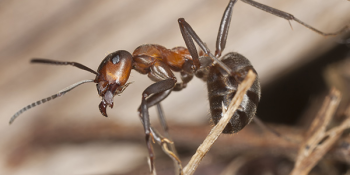
Image source: “Ants”,
The National Wildlife Federation
Most ants provide many benefits to our ecosystem, including aerating soil, consuming other insects and expediting decomposition of dead plant and animal matter. There are more than 12,000 species of ants and only a small percentage of these insects are considered to be pests (such as Carpenter ants and Fire ants).
Facilities Management inspects building exteriors and works with a pest management company to prevent problem insects from damaging buildings and getting indoors whenever possible. All MHC community members should avoid attracting ants by keeping all food and trash picked up and cleaning up spills right away. Inspect the potted plants in your space regularly and care for them properly - do not overwater and remove them right away if you see signs of ants, other insects or plant mites.
Ants are great when they are outside, so let’s all work together to keep them there!
If you see a potential problem area on a building exterior or notice ants gathering inside a building, please submit a service request or call the Facilities Management main office: 413-538-2012.
Bats
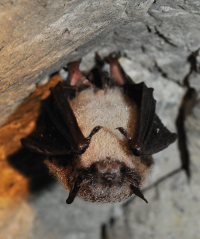
Photo by Bill Byrne,
MassWildlife “A Little Brown Bat (Endangered) in a cave”
Bats are the only flying mammals in the world. Bats have been decimated by disease and human activities that include habitat destruction, encroachment and pollution. Though often misunderstood, bats are friendly animals that are critical to our ecosystem. Hundreds of species of fruits depend on bats for pollination and they eat disease-carrying insects, like mosquitoes. It’s easy to see why the U.S. Fish and Wildlife Service says that bats are heroes of the night.
While bats are truly beneficial to have around outdoors, sometimes they get inside buildings seeking shelter. When that happens, we work with a wildlife management professional to safely remove the bat using a one-way door or other humane method so that the bat can’t re enter once it leaves. Bats are protected in Massachusetts and there are only certain months of the year where attempts to evict a bat can be made (May and from August 1st to mid-October).
The College must balance the protection of wildlife with the safety of our community. While most bats are healthy, there is a potential for them (like other wild animals) to carry rabies. In certain situations, an attempt to safely capture the bat must be made so that it can be tested for rabies. The situations that warrant this are a known exposure or a potential exposure to rabies, as specified by MA Department of Public Health:
- Known exposure: being bitten or scratched by a bat or any wild animal
- Potential exposure: if a bat is found in a room with a sleeping person, a mentally incapacitated person, an unattended young child, or an unattended animal, the bat should be safely captured and tested for rabies
In these instances, the South Hadley Board of Health would be notified and provide the College with guidance on testing and any other health requirements.
If anyone in a residence hall or College housing wakes up with a bat in their room, or if a bat is seen inside any College building, immediately leave the room or area, close doors, if possible, and call the Facilities Management main office: 413-538-2012. After hours, call Public Safety and Service: 413-538-2304.
Faculty and staff in rental housing must contact the Rental Housing Department's emergency number: 413-542-8506.
Faculty, staff and students in non-College housing should follow MA DPH guidance: What to Do if You Find a Bat in Your Home.
Some animals can be protected with vaccination. If your animal is bitten or scratched by any wild animal or if you find a bat in a room with your animal, contact your veterinarian right away for guidance, even if the animal is vaccinated.
Employees with possible bat exposure resulting from their work on campus should immediately notify their Supervisor, seek medical attention and follow procedures for accidents and job-related injuries. Students should contact College Health Services during the academic year or another provider during the summer and other College breaks when the Health Center is closed. Other MHC community members should contact their personal health care provider.
Like many other situations, the best method is prevention. Do not leave windows or doors open and always report damaged screens or other building issues to Facilities Management by submitting a work request. If you have questions about bat procedures at MHC, please write to ehs@mtholyoke.edu.
Bears
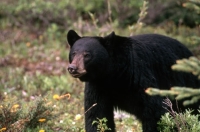
Photo credit: American black bear.jpg,
USFS, Public Domain,
https://www.fws.gov/media/american-black-bear.jpg
Black bears are common in Massachusetts and, though they are generally wary of humans, they may occasionally venture onto campus. If you spot a bear on campus, stay clear of it and call Public Safety and Service (413-538-2304). Do not attempt to get closer for photographs or for any reason. Bears will usually go away on their own if they do not become antagonized or frightened.
Removing food sources and properly disposing of trash are important measures we can all take to avoid attracting bears and other wildlife to areas where it’s not safe for them or the community. Learn more about how we can coexist with bears and what to do if you encounter one in nature on MassWildlife’s ‘Learn about black bears’ website.
Please always keep a safe distance from bears and other wildlife. Any time you have a concern about wildlife at Mount Holyoke, please contact Public Safety and Service (413-538-2304) to describe what you see and where. Public Safety and Service will initiate help from Animal Control or other agencies, if needed, and determine if there is a risk to the community. For your safety and theirs, please do not approach bears or other wildlife.
Beavers
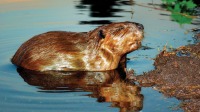
Image source: “Learn About Beavers”,
MA Division of Fisheries and Wildlife
Beavers are North America’s largest native rodents. They are strict vegetarians that can live up to 20 years and they mate for life. Beavers build dams that form shallow ponds and create wetlands that provide habitat for countless plants and wildlife. Wetlands are also important because they store and slowly release floodwater, preventing flooding downstream, and they filter out pollutants and sediment.
In most cases, beavers provide vast benefits to the environment and humans. However, there are times that beaver activity can threaten public health or safety, including flooding roadways or causing septic system flooding. When a hazard to public health or the environment requires the removal of a beaver or the breaching or removal of a dam, it will be done by a licensed wildlife professional in accordance with the regulations of the Massachusetts Division of Fisheries and Wildlife (MassWildlife) and the Town of South Hadley Board of Health.
Bed bugs
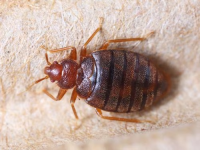
Image source: “What Do Bed Bugs Look Like”,
MA Department of Public Health
Bed bugs are wingless insects that feed on the blood of people and animals. They are small, flat, brown, and oval and their range in size is sometimes compared to poppy seeds up to apple seeds. Bed bugs are not known to spread infectious disease, but their bites can cause irritation or turn into larger sores.
Despite their name, bed bugs can also be found in other areas, including offices. Bed bugs are carried into places in luggage, backpacks, linens and other personal belongings. Before bringing newly acquired porous items or clothing (preowned or new) or anything from a free exchange into your space, check carefully. Anyone moving into a new space should do a thorough inspection before unpacking and travelers should inspect their lodging upon arrival. The inspection should focus on common bed bug hiding spots:
- Beds (seams, tufts, and crevices of mattresses and box springs), bed frames, headboards, and in clutter under beds
- Carpets and baseboards
- Behind loose wallpaper
- Folds of curtains and drapes
- Clocks, radios, or phones near a bed or on a nightstand
- Inside and underneath drawers
- Picture frames
One small bed bug can lead to a big problem. Bed bugs hide in small spaces—all MHC community members should make an effort to minimize clutter and practice good housekeeping in their individual spaces so potential issues are discovered right away.
In addition to seeing a live bed bug, other signs of bed bugs include droppings, which can form dark stains on linens, cloth or carpeting or bumps on hard surfaces. Bed bugs shed their skin through molting which may be visible along with bed bug eggs, which are very small, but can be among crevices where adult bed bugs are hiding.
Do not try to solve a bed bug problem at the College on your own. Sprays or other actions done the wrong way can actually make matters worse. All reports of bed bugs on campus will be investigated and addressed by a licensed pest management contractor, coordinated by Facilities Management. We understand that it can be very stressful, but please do not delay reporting any concerns about bed bugs, even if you are not sure.
- Residential students should immediately report a bed bug concern to the Office of Residential Life: 413-538-2088
- Faculty, staff and students with bed bug concerns in offices or other nonresidential College buildings should immediately notify Facilities Management: 413-538-2012
Do not move or discard any belongings from the area of concern without guidance. In College buildings, the professional pest management contractor will determine the best methods to eliminate the bed bugs, which may include any combination of targeted pesticide application, heat treatment, laundering, HEPA-vacuuming or disposal of items. Surrounding and adjacent areas may need to be inspected if it’s determined that there is an infestation that could have spread.
For individuals living in residence halls or other College housing, relocation may be offered or required, depending on the severity of the issue and the recommendations and treatment method(s) determined by the pest management contractor.
MHC community members that do not live in College housing should follow the steps detailed in MA DPH’s information section: How do I get rid of bed bugs? Take prompt action to avoid carrying bed bugs to campus or anywhere else you visit.
Students with medical questions or concerns about bed bug bites should contact College Health Services during the academic year or another provider during the summer and other College breaks when the Health Center is closed. Employees should reach out to their personal healthcare provider.
The sooner corrective actions are taken, the less likely it is that there will be an infestation that could spread to other areas of our campus. We must act quickly to confine and eradicate the problem.
Bees and wasps
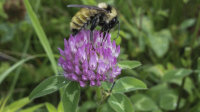
Image source: “Plant a bumblebee-friendly garden”,
MA Division of Fisheries and Wildlife
Bees, wasps and other wild pollinators are vital to our ecosystem and we depend on them in many ways. In addition to pollinating, they eat invasive insect pests. Human activities, including habitat destruction, pollution and pesticide use have seriously harmed pollinator populations in Massachusetts and around the world.
In most cases, it is best practice to leave a bee or wasp nest alone and keep your distance whenever possible. When nests are located in areas that could pose a risk to the community, a licensed pest management company will be contacted to remove the nest in a safe manner.
Stings can sometimes cause severe allergic reactions in some people. Students with medical questions or concerns about stings should contact College Health Services during the academic year or another provider during the summer and other College breaks when the Health Center is closed. Employees should reach out to their personal healthcare provider. Call Public Safety immediately in all emergencies on campus: 413-538-2304.
For general information about bees in the Northeast (native and honey bees), check out the UMass publication A Review on Bees or Worcester Polytechnic Institute’s Beecology Project. Beekeepers can learn about honeybee health through the Bee Informed Partnership. Other great information resources include the The Bee Conservancy and the Massachusetts Department of Conservation and Recreation’s Growing Wild Massachusetts. There are many ways to learn about and help bees and other pollinators!
Bobcats, coyotes and foxes
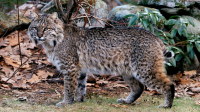
Image source: “Learn About Bobcats”,
MA Division of Fisheries and Wildlife
Bobcats, coyotes and foxes live in the area and may be seen on campus. These animals are typically shy and avoid encounters with humans. If you come across one, keep a safe distance and make noise by clapping your hands or whistling - they will most likely leave on their own. If one begins to approach you, make yourself look bigger by lifting and waving your arms. Please avoid attracting these animals by keeping garbage secure, and feeding pets indoors. Please respect all wildlife and keep your distance.
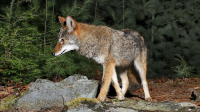
Image source: “Learn About Coyotes”,
MA Division of Fisheries and Wildlife
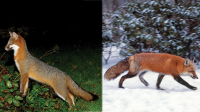
Image source: Learn About Foxes, “Gray fox (left), red fox (right)”,
MA Division of Fisheries and Wildlife
Fishing at Upper Lake
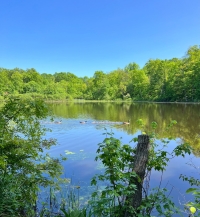
Photo by Iris Gonzalez Carpio,
Mount Holyoke College Athletics
“Shore of Upper Lake”
Fishing is permitted from the shore of Upper Lake. Fishing from the dam is strictly prohibited. Swimming or wading into the water to fish are not permitted at any time. Anyone aged 15 or older must have a valid Massachusetts Freshwater Fishing License. In accordance with state law, “You must carry your license with you when fishing, either as a paper copy or on your smartphone. If asked, anglers have to display a true, complete, and legible image of a valid license. Licenses expire each year on Dec. 31.”
Fishing is not allowed at any time or place on Lower Lake or any of the brooks, streams or bridges between Park Street and Morgan Street. Violators will be asked to leave the campus.
Do not leave abandoned lines, hooks, bobbers or any other fishing gear behind—these items could cause serious harm to wildlife.
Upper Lake, and the entire campus, is a diverse ecosystem that is home to a variety of wildlife, including species that are endangered, threatened, or classified as special concern. Catching anything other than fish, or moving, handling or disturbing frogs or other amphibians, snakes, turtles or any other wildlife in any way is strictly prohibited.
The entire campus is smoke free. Smoking or tobacco or cannabis products of any kind are not allowed anywhere at any time on campus, including in personal vehicles in parking lots or on College roadways.
Take your trash with you—leave nothing behind.
Keep dogs leashed at all times for their own safety as well as the safety of wildlife and other people. Always clean up after your dog and pack it out with you wherever you are. Dog waste left on grass, trails, the woods or anywhere, even your own yard, poses health risks and pollutes waterways when runoff washes into them. When it comes to pet waste, Think Blue.
Please respect these beautiful spaces that we have the great privilege to enjoy and the responsibility to preserve.
Geese and other birds
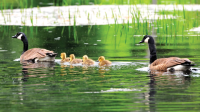
Image source: “Learn About Canada Geese”
MA Division of Fisheries and Wildlife
The campus is home to around 80 species of birds and there are many opportunities in the surrounding areas to view breathtaking sights like Great Cormorants, eagles, hawks and other birds, seen near the MHC Community Boathouse along the Connecticut River. All birds are protected by Massachusetts state laws and federal laws under the Migratory Bird Act of 1918.
MassWildlife monitors wild bird populations for illness and requests a report in certain situations. If you see a dead bird on College property and are not sure whether a report is required, please write to ehs@mtholyoke.edu or contact the Facilities Management main office: 413-538-2012.
Canada geese have passed through Massachusetts for centuries, but did not commonly nest in our state before the 1930s. Now, there are Canada geese in Massachusetts year round and an increasing number of Canada geese have been settling on MHC’s campus to nest. The abundance of short grass, lakes, lack of natural predators and supplemental feeding have created an explosion in campus goose numbers. While Canada geese can be enjoyable to watch, they can sometimes pose health and environmental concerns. A single adult Canada goose can produce up to 1.5 pounds of droppings per day, which can contain pathogens that may be harmful to the public and affect the health of waterways when runoff washes it into the lake. While it’s absolutely true that geese are far from being solely to blame for polluting waterways—agricultural runoff and other human activities are the main causes—by taking certain measures, we can try to prevent pollution from points on our campus.
At times the College must intervene to encourage the Canada geese to leave campus or, whenever possible, discourage them from settling here in the first place. Announcements to the community will be made. All interventions are nonlethal and are endorsed by the U.S. Fish and Wildlife Service and the Humane Society of the United States. Please do not approach or interfere with any goose control effort. All care will be taken to ensure no geese or other wildlife are harmed during the process.
One control measure is hiring a professional company with highly trained border collies that understand that they must move the geese, not catch them. This process can involve multiple visits at varying times so the geese don’t become accustomed to the routine and it is not done when goslings who can’t fly are present. Great care is taken to ensure the safety of geese, dogs and MHC community members.
Another control measure involves the placement of goose deterrent predator decoys around campus. The decoys are fiberglass figures of canines and encourage migratory Canada geese to fly to a perceived safe place away from campus.
Remember to respect and protect all wildlife by refraining from feeding and always maintaining a safe distance!
Ladybugs
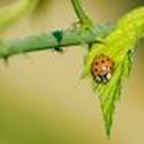
Photo by Ron Desrosiers
Image Source:
MassAudubon: Ladybugs
Ladybugs are beneficial insects because they eat pests that harm trees, including apple, pear and pine trees. According to the USDA, ladybugs have helped farmers significantly reduce their use of pesticides in some areas. There are many species of ladybugs, native and non-native, found in Massachusetts. The Massachusetts state insect is the seven-spotted ladybug, designated in 1989.
Ladybugs prefer to lay their eggs outdoors and do not spread disease, though they can be an allergen to some individuals. While many people enjoy seeing ladybugs outdoors, they may not want to share their space with them indoors. Ladybugs enter buildings seeking shelter from the cold until warmer temperatures arrive in the spring and they try to get back outside. Ladybugs should be released outside - remember to promptly close the window or screen afterward. If outdoor release is not an option, they can be removed using a vacuum cleaner - when done, put the vacuum contents in a sealed plastic bag and put it in an outdoor trash receptacle. Do not squish ladybugs when you see them indoors - they can leave a yellowish stain and a foul odor.
Learn more on MassAudubon’s Ladybugs page. If you see an accumulation of ladybugs in an indoor space and need assistance, please contact Facilities Management: submit a service request or call the main office at 413-538-2012. Please do not prop entry doors open and report missing or damaged screens or any other building concerns right away.
Mice and other rodents
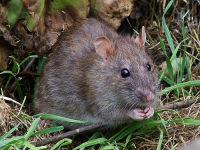
Photo credit: USDA: “Rodent”
US Environmental Protection Agency (EPA)
Rodents and Schools
Mice and other rodents play a critical role in our ecosystem. They help control insect populations, disperse seeds and can even pollinate plants. They are an important food source to birds of prey and other animals. Studies have shown that mice and rats are intelligent creatures. Their intelligence plays a part in leading them to trouble as they are very adept at getting into buildings and homes through the smallest of openings in structures. Our primary goal is to prevent mice, squirrels, chipmunks and other rodents from entering buildings by repairing and sealing openings upon discovery.
Despite our best efforts, mice sometimes make their way indoors. Often, you’re more likely to see signs of a mouse, like droppings or gnaw marks before you see an actual mouse. If you know or suspect a rodent is in a building, please report it right away. Rodents can spread disease when humans come into direct or indirect contact with them. A licensed pest management company routinely inspects all college buildings for mouse activity, and treats when necessary, following the colleges Integrated Pest Management policy. They also respond to all reports of mice in a College building and will make frequent inspections to monitor the area. All cleaning and disinfection will be done by trained personnel in accordance with CDC guidance - if you have questions about these procedures, please write to ehs@mtholyoke.edu.
Students with medical questions or concerns about rodent exposure should contact College Health Services during the academic year or another provider during the summer and other College breaks when the Health Center is closed. Employees with concerns about possible rodent exposure resulting from their work on campus should immediately notify their supervisor and follow procedures for accidents and job-related injuries. Other MHC community members should reach out to their personal healthcare provider.
All MHC community members should take measures to avoid attracting rodents by storing food properly, cleaning all spills and respecting shared spaces, eliminating clutter, picking up trash, rinsing out beverage and food containers before putting them in the recycling bin, not propping entry doors open and promptly reporting concerns. If you see a potential problem area on a building exterior or see a mouse or droppings indoors, please submit a service request or call the Facilities Management main office: 413-538-2012. Please provide specific information including time, date, room/ area and location of the sighting. The College is committed to maintaining an environment where all feel safe to live, learn and work. Together we can prevent problems and, with good communication, we can work quickly to solve them if they arise.
Mosquitoes

Image source: “Culex species mosquito”
Mosquitoes in the United States
Centers for Disease Control and Prevention
When it comes to mosquitoes, prevention is key. Avoid things that attract them like perfume, cologne and other scented products. When outdoors, wear insect repellent, long sleeved clothing and be aware that mosquitoes are most active from dusk to dawn. Eliminate standing water and make sure screens and doors are in good condition. Please report missing or damaged screens or any standing water issues at any College building to Facilities Management by submitting a service request or calling the main office: 413-538-2012.
Mosquitoes can carry viruses that cause disease and, at times, our region is impacted by infected mosquitoes. Learn more about how determinations are made regarding outdoor activities at Mount Holyoke College and arbovirus risk levels by visiting our mosquito and tick precautions page.
Snakes

Image Source:
“Eastern Ratsnake (Endangered)”
Snakes of Massachusetts
MA Division of Fisheries and Wildlife
Snakes play a vital role in our ecosystem, including controlling rodent populations. There are 14 species of snakes that live in Massachusetts, five of which are endangered, threatened or designated as special concern. One of the endangered species, the Eastern Ratsnake (pictured above) has been seen on campus. The Eastern Ratsnake is the largest snake in Massachusetts - it is a nonvenomous, docile snake and is endangered due to human activity, including habitat loss caused by residential housing construction and illegal pet trade. You may see this snake by Upper and Lower Lakes, in wooded areas or peacefully warming itself in sunny spots. Some may be intimidated by its large size, but it will not harm you - give them space and do not disturb them!
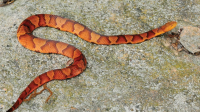
Image Source:
“Copperhead (Endangered)”
Snakes of Massachusetts
MassWildlife
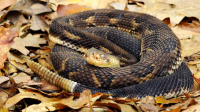
Image Source:
“Timber Rattlesnake (Endangered)”
Snakes of Massachusetts
MassWildlife
Most of the snakes that live in Massachusetts are nonvenomous; however there are two venomous snakes in the state, both of which are endangered: Copperhead and Timber Rattlesnake. Copperheads are endangered members of the pit viper family. They are not known to be in Hampshire County, where South Hadley is, but they are found in nearby Hampden County. Copperheads are venomous, but they are not aggressive toward people and would likely only bite when stepped on or touched. Copperhead bites require immediate medical attention, but they are not fatal. Timber Rattlesnakes are also endangered pit vipers. They are venomous and their bites require immediate medical attention, but they are very rarely fatal. Most Timber Rattlers bites are due to illegal handling or harassment.
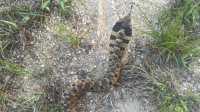
Image Source:
“Eastern Hog-nosed Snake (Special Concern)”
Snakes of Massachusetts
MassWildlife
The Eastern Hog-nosed snake is nonvenomous and it is the only snake native to Massachusetts that makes a hissing noise - its current status is threatened. The Eastern Wormsnake is nonvenomous and is classified as a special concern species.
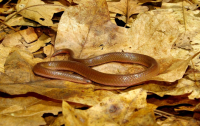
Image Source:
“Eastern Wormsnake (Threatened)”
Snakes of Massachusetts
MassWildlife
You can help by reporting an observation of an endangered, threatened or special concern species:
MassWildlife is requesting information which will help with habitat management and wildlife conservation. If you see any of the endangered, threatened or special concern species of snake described above, or any other wildlife species (including plants and insects) in those categories, please submit a report, which can be done online or through the mail:
-
create an account in the Heritage Hub, OR
-
complete and mail a Rare Animal Observation Form for one-time observations
A few minutes can make a big difference! Please consider providing the information requested by MassWildlife and thank you in advance for your conservation efforts. Alternatively, you can email the EH&S office and we will submit the report: ehs@mtholyoke.edu.
In the highly unlikely event that a snake is found inside a College building, a licensed wildlife professional will be contacted to safely remove it. Contact the Facilities Management main office at 413-538-2012 or call Public Safety and Service after hours at 413-538-2304.
If you are bitten by a snake or any wild animal on campus, call Public Safety and Service immediately: 413-538-2304.
Learn more about snakes and how to identify them on MassWildlife’s Snakes of Massachusetts website. Remember to respect and keep your distance from snakes and ALL wild animals.
Spotted Lanternfly
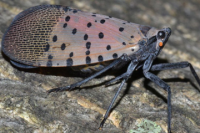
Image source: “Spotted Lanternfly”
USDA Animal and Plant Health Inspection Service (APHIS)
The Spotted Lanternfly (SLF) is an invasive insect, native to Asia. It’s thought that the SLF most likely came to the United States inside a stone shipment in 2012. The SLF attacks trees, shrubs and vines and has the potential to impact crops and other food products, including grapes, wine, apples, peaches, maple syrup and more.
The SLF was first spotted in Pennsylvania in 2014 and is currently found in 14 other states, including Massachusetts. A single dead SLF was found in Boston in 2018 and by 2020, the SLF was discovered in several parts of Massachusetts.
The Massachusetts Department of Conservation and Recreation (DCR), USDA Animal Plant and Health Inspection Service (APHIS), and the US Forest Service are all working together. You can help the effort to eradicate the SLF from Massachusetts and the United States. Report any suspected SLF sighting to the USDA APHIS by submitting the Spotted Lanternfly Report form.
Check out the USDA’s Spotted Lanternfly photo gallery and learn more about the Spotted Lanternfly in Massachusetts on the MA DCR’s website.
With all bugs and insects, preventing them from getting indoors is the best, most effective measure. Please do not prop entry doors open and report missing or damaged screens or any other exterior or interior building concerns right away to Facilities Management by submitting a service request or calling the main office: 413-538-2012.
Stink Bugs
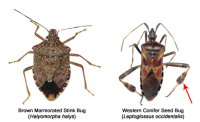
Image source: Massachusetts Introduced Pests Outreach Blog,
‘Brown Marmorated Stink Bug’
Image courtesy of Ted Kropiewnicki, bugguide.net.
Western Conifer Seed Bug
Image courtesy of Giancarlo Dessi, Wikimedia Commons
The Brown Marmorated Stink Bug is an invasive species, first found in Massachusetts in 2007, that causes severe damage to fruit, vegetable and nut crops and other plants. To avoid causing an odor release, do not squish this bug if you see it indoors - capture it in a container and bring it to an outdoor trash receptacle or carefully suck it up with a vacuum, then empty the vacuum contents into a sealed plastic bag and bring it to an outdoor trash container. If you suspect you have found a Brown Marmorated Stink Bug, you can report it by completing the Massachusetts Department of Agricultural Resources (MDAR) report a pest form. MDAR and other agencies use the information to help farmers and other growers with the ultimate goal of protecting farms, food and our environment.
Western Conifer Seed Bugs are more common in our area and can also be stinky. These bugs look similar to Brown Marmorated Stink Bugs, but their body is more narrow and their legs are thicker. Western Conifer Seed Bugs are native to the west coast of the United States, but made their way to the east coast in the 1990s. These bugs are considered a minor pest to the Douglas fir, pine and hemlock trees that they attack. Western Conifer Seed Bugs emit a pungent odor when startled. To avoid causing an odor release, do not squish this bug if you see it indoors - capture it in a container and release it outdoors.
Stink Bugs most often try to enter buildings during the fall season and gain entry through open, unscreened windows and doors. With all bugs and insects, preventing them from getting indoors is the best, most effective measure. Please do not prop entry doors open and report missing or damaged screens or any other exterior or interior building concerns right away to Facilities Management by submitting a service request or calling the main office: 413-538-2012.
Ticks

Image source:
“Tick-borne disease prevention”
MA Department of Public Health
Ticks are parasitic arachnids that are often found in wooded or brushy settings or areas with tall grasses. A tick infestation inside a building is not likely because ticks do not fly or enter buildings on their own—they are carried indoors on a human or animal host.
Personal preventative measures, such as wearing insect repellent, light-colored long sleeves and pants, staying in the center of trails and thoroughly checking yourself after being outdoors are very important.
If you find a tick attached to you, grip it as close to the skin as possible with fine point tweezers and pull it straight out. If possible, keep the tick in a sealed container in case it is needed for future observation. Make a note of the date and bite location on your body. If you suspect it is a deer tick, get medical advice. Always seek medical care if you develop a rash or any other signs of illness after being bitten by a tick.
Work with your veterinarian for prevention measures and to learn about signs of illness in your pet or companion or service animal and thoroughly check them after being outdoors, too.
Employees with questions or concerns about tick bites and tick-borne diseases should reach out to their healthcare provider. Students should contact College Health Services during the academic year or another provider during the summer and other College breaks when the Health Center is closed. Learn more about tick-borne diseases and related MHC community updates on the mosquito and tick precautions page.
Turtles
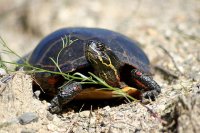
Photo by Mike Jones
“Eastern Painted Turtle”
MassWildlife
Massachusetts is home to sea turtles and 10 species of native freshwater turtles and one species of nonnative, introduced species of turtle. Six of the native turtle species are listed under the Massachusetts Endangered Species Act (MESA).
On campus, turtles can be spotted basking in the sun around Upper and Lower Lakes. Please photograph and enjoy them from a distance. Catching, moving, handling or disturbing turtles in any way is prohibited.
Turtles are sometimes seen crossing roads especially from mid-May to early July. If you see a turtle in a roadway, please call Facilities Management’s main office: 413-538-2012 to report it. Learn more about Turtles in the Road and other ways to assist on MassWildlife’s Guide to Helping Massachusetts Turtles website.


Explore the MHC Social Universe >